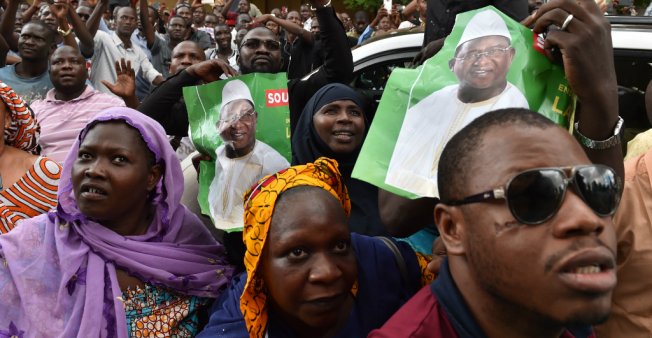Mali opposition leader rejects election result as counting underway
Malian opposition candidate Soumaila Cisse said on Monday he would reject the results of a presidential runoff marred by accusations of fraud, violence and low turnout, calling on the population “to rise up.”
Ballot counting was underway on Monday across the vast West African country after the vote Sundaysaw one poll worker killed and hundreds of stations closed due to insecurity.
“The fraud is proven, this is why there are results we will not accept,” Cisse said at his party’s headquarters in Bamako.
“I call on all Malians to rise up… We will not accept the dictatorship of fraud,” he added.
President Ibrahim Boubacar Keita, 73, is the clear frontrunner in a reprise of his 2013 faceoff against former finance minister Cisse, 68.
But Cisse’s team and other opposition contenders have repeatedly accused the government of fraud, including ballot-box stuffing and vote buying.
However the African Union (AU) election observers said the voting was carried out “in acceptable conditions,” in a preliminary report published Monday.
At this stage there is “no tangible element” pointing towards voting irregulariities, the observers said, congratulating the Mali government for its efforts to improve the voting process and noting a drop in the number of untoward incidents in the second round of voting.
The European Union also said that in the 300 polling stations its observers visited, no “major incident” occurred.
Nearly 500 polling stations were unable to open on Sunday, the government said, mostly in regions plagued by jihadist violence and ethnic tensions.
“We had a little over 3.7 percent of stations which had not functioned properly” during the first roundon July 29, Salif Traore, Mali’s security minister, said on Monday.
The figure fell to 2.1 percent of the 23,000 polling booths in Sunday’s runoff vote, which Traore said was due to the deployment of more military.
In a reminder of the jihadist threat that was a major campaign issue, the overseer of a polling station in Arkodia, in the northern region of Timbuktu, was shot dead on Sunday by armed Islamist militants, local officials said.
Aside from this “dramatic case,” the government said the poll occurred without incident.
Turnout however was just 22.38 percent, local monitors of the POCIM (the Mali Citizen Observation Pool) said.
Fraud allegations
In the first-round vote on July 29, Keita was clearly ahead, with 42 percent against 18 percent for Cisse.
Despite fierce criticism of Keita for his handling of the security crisis, Cisse failed to rally the support of other parties behind him for the runoff, leaving the incumbent seemingly on track for a second consecutive landslide.
Results are expected by mid-week at the earliest.
The three main opposition candidates had mounted a last-ditch legal challenge to the first-round result, alleging ballot-box stuffing and other irregularities.
But their petition was rejected by the Constitutional Court.
Cisse’s party told AFP in the early hours of Sunday that ballot papers were already circulating, several hours before polls opened.
In at least six stations in the capital of Bamako, voting reports — which give the number of voters and votes cast for each candidate — were signed before the numbers were filled in, an AFP journalist witnessed.
The opposition leader, in a meeting where hundreds of supporters had gathered on Monday afternoon, also said the programme his party uses to count votes — which had put him in the lead until then — was hacked overnight.
Six members of his campaign team, including four French, were arrested on Sunday, the team and Traore, the minister of security, said.
Five of the six were released without charges after being held for two hours in a Bamako police station, a source close to the team said. Their phones and laptops were seized.
Violence
Mali, a landlocked nation home to at least 20 ethnic groups where the majority of people live on less than $2 a day, has battled jihadist attacks and intercommunal violence for years.
Beyond its borders, the international community hope that the winner will consolidate a 2015 accord that the fragile Sahel state sees as its foundation for peace.
The deal brought together the government, government-allied groups and former Tuareg rebels.
But jihadist violence has spread from the north to the centre and south of the vast country and spilled into neighbouring Burkina Faso and Niger, often inflaming communal conflicts.
A state of emergency heads into its fourth year in November.
France still has 4,500 troops deployed alongside the UN’s 15,000 peacekeepers and a regional G5 Sahel force, aimed at rooting out jihadists and restoring the authority of the state.
(AFP)





